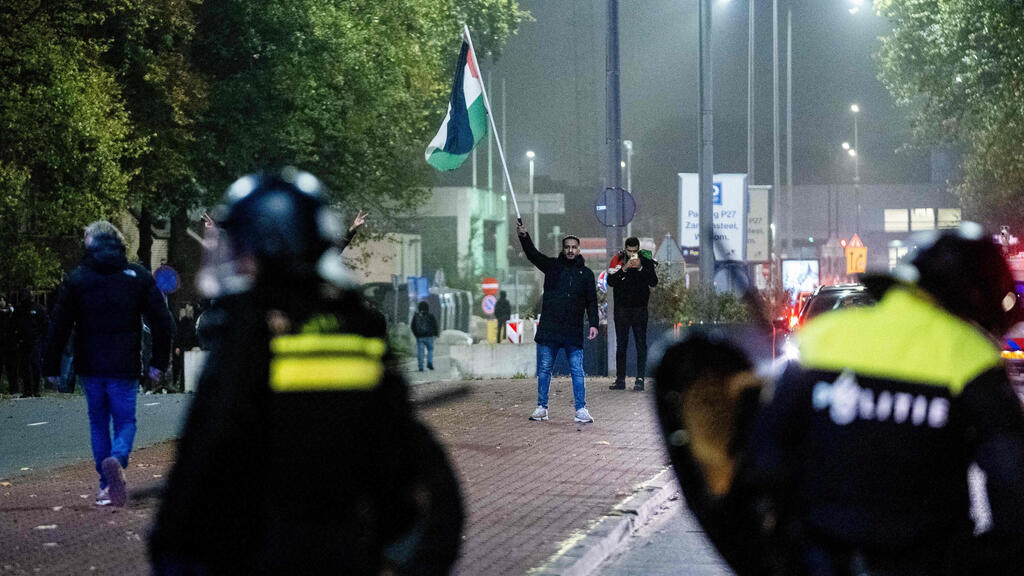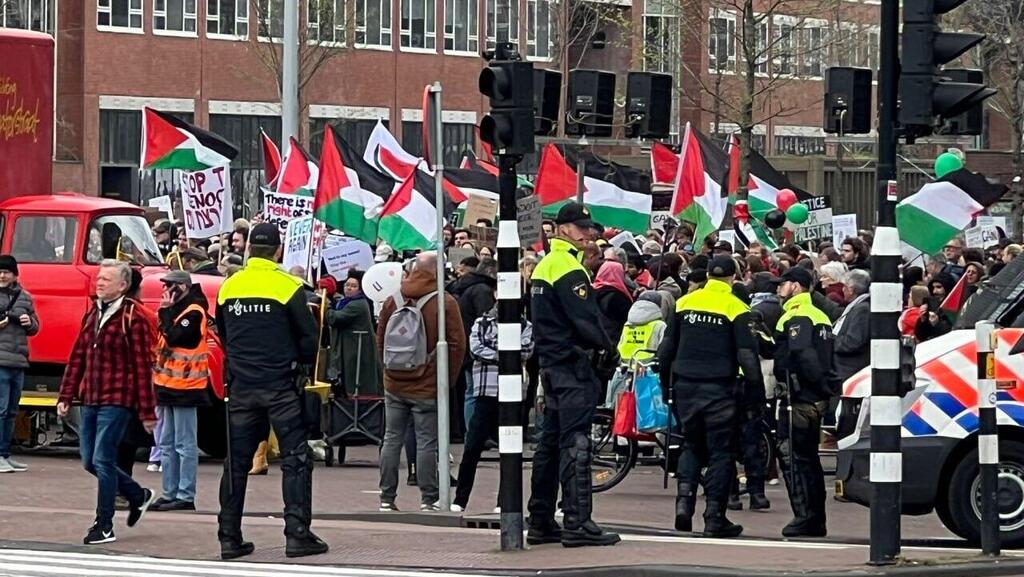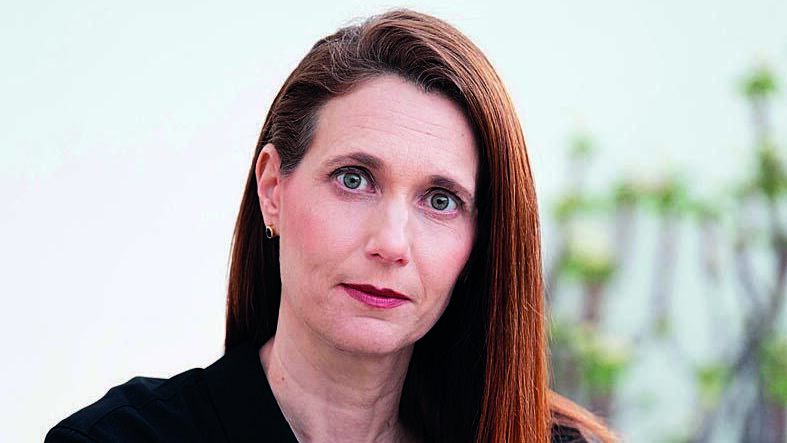Getting your Trinity Audio player ready...
The rise in antisemitic incidents across Europe in 2024 has reached a fever pitch in recent years. This troubling trend, intensified by the ongoing war in Gaza, has manifested in various forms — from physical violence to institutional discrimination. Differences in enforcement policies between countries have led to significant disparities in the handling of antisemitic incidents.
According to data from the EU’s Fundamental Rights Agency (FRA), nearly 96% of European Jews have encountered some form of antisemitism. Data from the World Zionist Organization indicates an over 400% increase in antisemitic incidents worldwide after October 7, 2023. This surge adds to the steady annual increase seen over the past decade, marking a new peak in antisemitism in recent decades.
Footage of rioters attacking Israeli fans in Amsterdam
The UK serves as an extreme example of the situation, with a 581% rise in antisemitic incidents following October 7. The CST organization, responsible for community security, reported over 4,000 incidents as of February 2024, nearly double the previous high set in 2021 after Operation Guardian of the Walls.
France is also one of the countries experiencing significant change since the outbreak of the war. In 2024, a Jewish man was stabbed in Paris and six Jewish minors were assaulted near a cinema. In a disturbing incident in Creteil, police forcibly removed the wig of an ultra-Orthodox Jewish woman.
The Holocaust memorial in Paris was vandalized with red handprints, over 80 Jewish gravestones in Dordogne were defaced with antisemitic graffiti, a synagogue in Marseille was vandalized with hate graffiti and philosopher Bernard-Henri Levy faced antisemitic harassment at an event in a synagogue.
In Sweden, Jewish-owned businesses and synagogues were subjected to vandalism and Jews in Malmo reported increased harassment. The entertainment industry became embroiled in controversy as professionals called to ban Israel from participating in Eurovision. Anti-Israel protests frequently crossed the line into overt antisemitism, escalating into physical incidents when Israeli supporters attended the 2024 Eurovision.
Ireland is also facing antisemitism. A Jewish man was attacked after entering a bar on Saturday. "Three young men waited until I was alone, asked if I was Jewish and beat me,” he recounted.
The incident adds to numerous protests and propaganda events in Ireland over the past year, including the Irish women’s basketball team refusing to shake hands with Israel’s team during the EuroBasket qualifiers and calls for a boycott of Israel, with stores displaying signs indicating they don’t sell Israeli products.
In Germany, a man threw a Molotov cocktail at a synagogue and pro-Hamas demonstrations outside synagogues included violent calls against Jews. The Jewish memorial in Babenhausen was vandalized along with Holocaust memorial stones, marking a disturbing pattern of attacks on both contemporary Jewish life and history.
However, the local authorities' handling and strict measures imposed by the state have deterred protesters. For instance, the slogan "From the river to the sea, Palestine will be free" has been banned, leading to the arrest and fining of a young woman for using it.
The Netherlands' lax policy
In November 2023, a report was presented to the Knesset detailing the dramatic rise in antisemitic incidents in the Netherlands. The country was the site of severe incidents over the last weekend when Maccabi Tel Aviv soccer club fans were attacked following a game against Ajax.
The report indicated an 813% increase in antisemitic incidents compared to the previous year — a direct result of weak policies and insufficient response by authorities.
Levy (a pseudonym), a Jewish resident of Amsterdam who spoke to Ynet on Sunday, commented on the incidents in the city, saying, "It wasn’t surprising at all. We’ve seen pure hatred toward Jews, antisemitism and I saw it at universities. I wore a Star of David necklace and I don’t wear it openly in Amsterdam. You’re only safe here if you don’t openly display a Jewish symbol and certainly not if you openly support Israel."
"I’m Dutch. I was born here and my parents and grandparents are Dutch so I don’t intend to move to another country because I can’t openly express a key part of my identity. But I thought and talked about it and it’s not crazy at all," he shared.
"This is a turning point for the government. The authorities made many mistakes. What happened on Thursday night in Amsterdam is insane. We all saw it coming and the fact that security forces didn’t anticipate it or didn’t act to prevent it is insane,” he added.
“The government itself is very supportive of Jews now and many politicians have expressed concern over the events and said the perpetrators should be prosecuted but there are also many politicians who are more understanding of it and some even view it as justified."
He advised hiding Israeli symbols to all tourists planning to arrive in the country. "Don’t bring Israeli passports, make sure you can’t be identified as Israelis. I don’t identify myself as Jewish; we’ve all seen what happened. It’s embarrassing that this is my city. I hope this is the turning point that will raise awareness among the Dutch that this isn’t the way to go. I’m quite skeptical, but we’ll see."
A series of severe incidents took place in the Netherlands in recent months: a Molotov cocktail was thrown at the Israeli Embassy in The Hague, an Orthodox rabbi was attacked in a shopping center in Utrecht and Israeli nationals were harassed at Schiphol Airport. In March, a Jewish woman was assaulted and harassed at her home by three women due to her daughter’s IDF service.
Her personal details were circulated in the neighborhood, but the authorities’ response to the case was weak. The memorial site at the Westerbork concentration camp and the synagogue in Middelburg were vandalized. The riots in Amsterdam mark a breaking point, necessitating the Dutch government to reevaluate its approach to combating antisemitism.
Academic institutions in the country are particularly concerning. The Royal Academy and the University of Rotterdam have severed ties with Israeli institutions under the guise of "concern for human rights." Holocaust-related classes have been canceled in Dutch universities. When academic institutions yield to anti-Israel pressure, they legitimize antisemitic behavior.
The various approaches to enforcement, counting and classifying antisemitic incidents make direct statistical comparison challenging.
While countries like the UK and Germany maintain detailed databases and specific legal frameworks for addressing antisemitism, other countries lack standardized reporting mechanisms or set different thresholds for what constitutes a prosecutable offense. Reporting is often done by communities and emissaries with most cases not reported at all.
"The sharp rise in antisemitic incidents forces us to act on two parallel fronts: education and enforcement,” said Dr. Raheli Baratz, head of the World Zionist Organization’s Department for Combating Antisemitism and Resilience.”
“It's crucial to realize that antisemitism isn't a 'Jewish problem' but a symptom of extremism and intolerance in society as a whole. At the same time, we call on law enforcement authorities across all European countries to adopt a more uniform and stringent policy toward manifestations of antisemitism,” she added.
‘No one has been arrested during the Jewhunt’
Israel’s National Security Council (NSC) reported on Saturday that security agencies estimated the wave of violence in Amsterdam has subsided, therefore "there’s no restriction on Israelis moving around the city." However, the NSC stressed that the Netherlands remains under a Level 2 travel advisory, recommending caution.
Amsterdam police arrested 62 people on the night of the attack. Yet only four remained in custody as of Saturday, including a 26-year-old man who was arrested the day after the riots, having been identified on security cameras.
Amsterdam prosecutors fined 40 rioters for public disorder, with ten of them suspected of various offenses including vandalism. The prosecution is still investigating the possibility that the riots were premeditated. "More arrests are expected," the prosecutors said.
Geert Wilders, head of Netherlands’ Party for Freedom (PVV) who met with Foreign Minister Gideon Sa'ar in his visit to the country on Saturday, claimed that all detainees were arrested during or before the game — not over the subsequent riots, based on local reports.
“I am speechless. Amsterdam Police just confirmed that NO ONE has been arrested during the Islamic Jewhunt in Amsterdam Thursday night. All arrests have been made before and during the soccer match and NOT during the pogrom,” he wrote on his X account.
Get the Ynetnews app on your smartphone:









